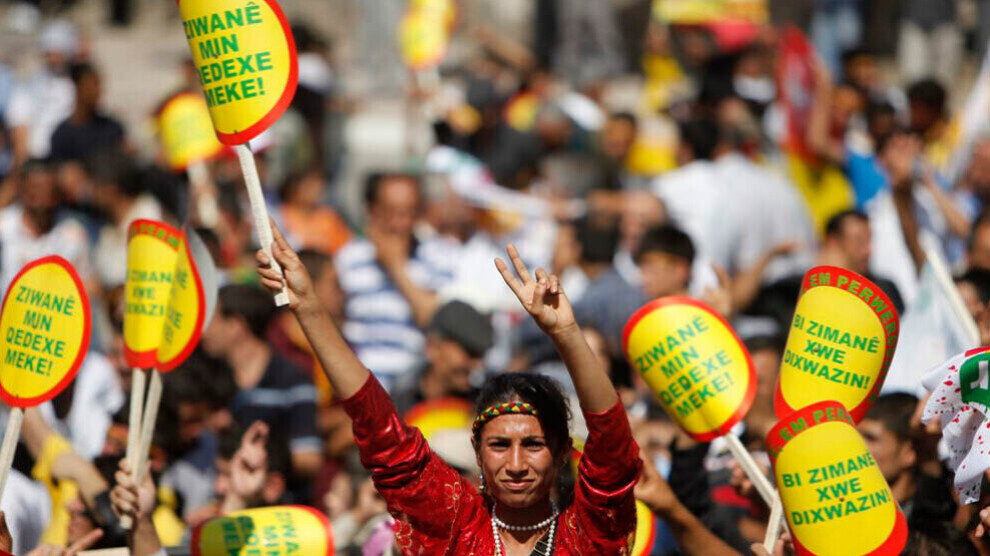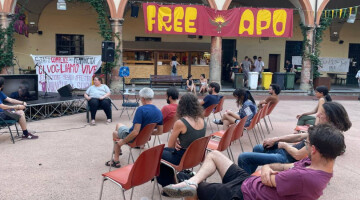May 15 has been celebrated as Kurdish Language Day since 2006. The date dates back to the first publication of Hawar magazine in 1932. Published in Damascus, the magazine is considered the school of Kurdish publishing and played an important role in the history of the Kurdish language.
In a statement on the occasion of Kurdish Language Day on May 15, the Education Committee of the KCK (Kurdistan Communities Union) said: "The struggle for language is the struggle for one's identity and existence."
The KCK stated that mother tongue education is an "absolutely legitimate right,” but also an indispensable right and necessity to organize and take action for the enforcement of this right in all spheres of life.
The KCK statement further includes the following:
"On the occasion of today's Kurdish Language Day, we first of all congratulate Rêber Apo [Abdullah Öcalan], who turned the hope for freedom of a people whose identity, language and existence was banned and whose existence was denied into an active struggle and who did not let anything stop him. At the same time, on the occasion of today, we congratulate all the martyrs who did not consider their death for the existence, language, values and freedom of their people as an end and thus became immortal. Likewise, we congratulate all the peoples of the world and our resistant people who, despite all the bans, oppression, intimidation, torture and murders, have always insisted on singing in their own language, telling heroic stories and singing songs of mourning, and have never surrendered accordingly.
Language as a survival tool
Language is not just a means of communication. It is the most important tool of people to keep their identity and culture alive and to give them a future. Every language carries the history, culture, literature, art and philosophy of life of a people. This is precisely why our people have never stopped defending, at the greatest sacrifice, their language, culture and existence against centuries of annihilation and physical genocide.
As a people and as its freedom movement, we in the Middle East insist on two vital practices and play a leadership role in relation to both: on the one hand, we reject denialism as a historical lie, while on the other hand, we do not accept the denial of all identities, species, existences, languages, sounds and ideas. Accordingly, we strive to live up to our existence. We want to live as God created us and as our mothers gave birth to us. We want to live with the language through which we became human beings. We want to live in harmony with our own truth and desire freedom for all languages, tones and colors. We must not forget that we are in the most promising era in terms of democracy and at the same time in a colorful geographical context. In this region, countless identities, communities, languages, religions and ethnicities meet. Their coexistence and the expression of each of these different identities is the most meaningful day of celebration for all of us. The revolution of Rojava is exactly this. We feel very fortunate that the Rojava Revolution, as a true cultural revolution, is leading the way for the aspiration of all languages and sounds to live freely."
Loss of one's own language means colonization and assimilation
Abdullah Öcalan takes the following position on the importance of the mother tongue: "The level of development of language is an expression of the level of development of life. The more a society develops its language, the more developed its level of life as a whole. However, the more a society loses its own language and comes under the hegemony of other languages, the more extensively it is exposed to colonization, assimilation and genocide. A society that gets into such a situation cannot have a mentality, morality, and aesthetic-meaningful life. It will always be exposed to an extremely tragic life as a sick society until its final annihilation.
Against this background, it becomes clear that language represents a common identity, dignity and the collective memory of a society. The defense and promotion of social memory is directly linked to the defense and protection of the mother tongue. When denial and genocide are practiced together, language prohibition occurs in practice. Calling the Kurdish language forbidden, problematic, separatist, backward and primitive is, in essence, an expression of a policy aimed at the annihilation of Kurdish existence. This makes it more necessary than ever for us to speak, write and think even more in Kurdish against this genocide, in order to organize, resist and fight for our language. For all Kurds who believe in a free future, it is therefore an indispensable task to fight against assimilation every day.
The Kurdish Language Day is a day to raise our awareness against the assimilation policy, to resist against the annihilation policy and to intensify the collective remembering against the memory loss. The premise 'there is no truth, there is only language' highlights the indispensable importance of language for the existence of a people. In this sense, the Kurdish language is the condition for the Kurdish people to be themselves. With the help of massive violence and all means of special warfare, attempts are being made to destroy our language and make it forgotten. To take a stand against this is still an urgent necessity that arises from our political existence, the tradition of our struggle and our responsibility towards our history and our people.
Language is passed on from generation to generation
We must never forget that language is kept alive by the younger generation and is thus passed on from generation to generation. Language develops through education and gains beauty through literature, art and culture. From everyday routine activities to the most diverse social production activities, we must use our language and connect with life through it. We must make life our first choice in the context of the Democratic Nation, which gives all languages their own means of expression. In this way, we will not become those who make revolution, but the revolution itself. Our people, both in Kurdistan and abroad, must see it as their most important task to speak and write Kurdish in order to make their mother tongue immortal. It must secure its right to mother-tongue education everywhere and fight resolutely to remove obstacles to the use of its mother tongue in all areas of public life. It must never give in to assimilation policies that promote linguistic homogenization.
This year's May 15 Kurdish Language Day also marks the 90th anniversary of the founding of Hawar magazine. On this occasion, we salute the Kurdish people who have never bowed to the policy of assimilation and denial. At the same time, we salute in the person of Celadet Ali Bedirxan and his comrades-in-arms all the people who have kept alive and promoted the Kurdish language with great sacrifices and immense efforts. We once again congratulate our people and all the peoples of the world on this year's Kurdish Language Day."















